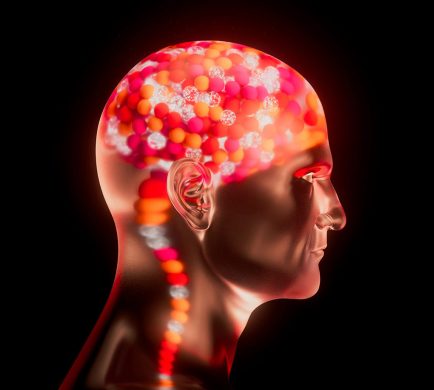By Dr. Nauman Naeem
In his fascinating book, Healing From The Inside Out: Overcome Chronic Disease And Radically Change Your Life,
Dr. Nauman Naeem explains the truth and meaning behind our emotions and what role they play in our lives
Emotions are one of the most complex entities to explain in words. They are how the mind communicates with your Higher Self and are felt directly in the body.
For example, if you are walking down the street and a stranger approaches you and asks for your wallet, you will feel fear. Immediately, signals are sent to your brain, and your hypothalamus is alerted to signal your autonomic nervous system, which activates your sympathetic nervous system.
The sympathetic nervous system prepares your body to deal with the danger by increasing your heart rate, and hence your cardiac output to increase oxygen delivery to your skeletal muscles. It also constricts the blood vessels to your internal organs, such as those of your digestive system, which are not needed to deal with the immediate threat. Your pupils also dilate to enhance your vision during the threat.
The sympathetic nervous system also stimulates the adrenal glands to release cortisol, epinephrine, and norepinephrine into the circulation. This results in the “fight-or-flight” response, which is manifested by an increase in heart rate, dilatation of the bronchial airways, and an increase in the metabolic rate, which helps you to respond effectively to whatever is threatening you. This example shows how emotions, fear in this case, are experienced in the body.
But what are emotions? What role do they play in our lives?
Emotions are the language of the soul. They are experienced in the physical body, because the body is the vehicle through which our souls experience life on Earth.
Because we have such a wide range of experiences in our earthly lives, we have a wide range of emotions we can feel. Often these emotions are not distinct but form a spectrum, much like how pure light can be refracted into different wavelengths of colors after passing through droplets of rain. Our emotions can range from utter despair and desolation to unbridled ecstasy, and everything in between.
Emotions are what give our life experiences meaning, but they are very subjective and are not an absolute. For example, you may perceive the loss of your job as devastating because it was the only source of your income. However, if you take a step back and put this into perspective, you will start to realize that your job was not fulfilling, you did not get along with your boss, and were anxious the entire time you were at work. So although you lost the only source of your income, it was probably the best thing that could have happened to you because it was not what you were born to do and was sucking the life out of you. This loss freed up your time to pursue your true passion and discover your life’s mission.
You can see how our emotions are subjective. So even though emotions are what give our life experiences meaning, it is important to note that it is the meaning we ascribe to these experiences that is subjective. The problem arises when we take these emotions as an absolute truth and fail to look for the deeper significance of the experiences that generated them.
What follows from this is that there is no such thing as a negative emotion. What, you say? Did I hear that right? Yes you did. Let me repeat that profound truth. There never has been and never will be such a thing as a negative emotion.
So how can such emotions such as sadness, grief, despair, depression, shame, regret, anger, hatred, jealousy, rage, and fear be perceived as anything but negative? I will try to shed some light on this issue.
They key here is that our emotions are our soul’s experience of life situations felt in the body. If what we experience is perceived as negative, then it simply means that we have a false sense of being incomplete or lacking something. This happens as a result of how we interpret events in our lives. But our souls can never be incomplete or lacking, because they are whole and complete by nature.
For example, if an intimate relationship suddenly comes to an end, we may feel sad because we feel a loss of love. But this is a false perception because love is our souls’ true nature, so it is something we can never lose. We simply perceive a loss of love because our soul experiences union with another soul in the physical plane through the medium of a relationship. This is a relative experience, with the absolute truth being that your true nature is that of unconditional love. I will delve more deeply into this in an upcoming chapter.
So if this is true, why do we feel sad when a relationship ends? It is because we have not yet realized our true essence as love, so the feeling is necessary to alert us that there is something greater that we have yet to understand or realize about ourselves. In fact, this is the purpose of all of our emotions.
Another example is the emotion of anger, which is usually experienced when something unexpected happens to us or something we are expecting to happen does not happen.
The truth of the matter is that there is nothing that can happen to us that we did not intend at a higher level of being. We only experience unexpected events as such due to a lack of insight into our multidimensional nature and our highest levels of intention. On the flipside, when we feel joy, peace, compassion, or ecstasy, it is a confirmation and a celebration of who we truly are.
The problem arises when we interpret our emotions as an absolute truth and not a reminder of where we lack understanding or an affirmation of our true nature. This usually happens when we have an emotionally intense experience that makes us feel uncomfortable. In these situations, we often suppress those emotions because of how they make us feel.
Dr. Nauman Naeem specializes in critical care, pulmonary medicine, and palliative care. His unique insights into healing stem from caring for tens of thousands of chronically and critically ill patients for nearly two decades. He lives with his wife and three children in Mississauga, Ontario, Canada. https://naumannaeem.com Healing From the Inside Out ISBN 9781844097364, Findhorn Press, Distributed by Legato Publishers Group (a division of Ingram Content Group)







